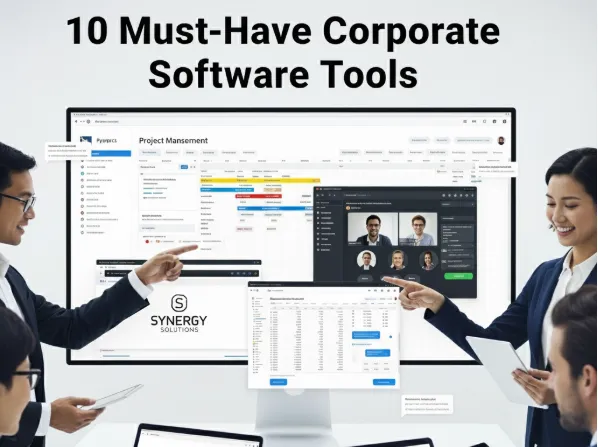10 Must-Have Corporate Software Tools to Keep Your Business Running Smoothly
Running a business today without the right software is like trying to drive a car without wheels—you won’t get very far. The right tools don’t just make work easier, they protect your data, keep your finances in order, and help your team stay connected.
But with so many options out there, which ones really matter? Let’s break down ten types of corporate software every modern business should consider.
1. Legal Workflow Automation Software
Tired of drowning in paperwork? Legal automation platforms (like Alf) cut through the chaos. Instead of spending hours drafting documents or double-checking compliance, you can automate repetitive tasks, create workflows that suit your business, and collaborate with your team in real time. Think of it as your digital legal assistant.
2. Cybersecurity Intelligence Tools
Data breaches aren’t just scary headlines—they’re costly. Tools such as Flexera Inspector Agent help IT teams spot vulnerabilities before hackers do. They scan thousands of applications, suggest patches, and integrate with existing systems like Microsoft SCCM. In short, they keep your business safe without adding extra work for your IT staff.
3. Property & Strata Management Software
If your company manages real estate or shared properties, specialized “body corporate” software is a game-changer. It handles everything from levy collection to utility tracking, while also providing owners with online portals. The result? Smoother operations and happier tenants.
4. Workflow & Collaboration Platforms
Clear communication can make or break a project. Tools like Grimaldi make it easier by combining task tracking, cloud file sharing, and built-in collaboration features. Whether your team is small and scrappy or large and distributed, having a central hub keeps everyone on the same page.
5. Security Patching & Monitoring Tools
Cyber threats don’t sleep, so neither should your defenses. Continuous monitoring software (such as another version of Flexera Inspector) takes care of patching, updates, and risk detection automatically. That way, your IT team spends less time firefighting and more time focusing on strategy.
6. Microsoft’s Productivity Suite
Love it or hate it, Microsoft is still the gold standard in workplace productivity. From Word and Excel to Teams and OneDrive, Microsoft 365 keeps work moving. Add in Azure for cloud power and enterprise-level security, and you’ve got a platform that scales with your business.

7. Tax & Compliance Software
Taxes are complicated—but they don’t have to be painful. Software like TurboTax for Business helps finance teams file accurately, stay compliant, and cut down on accounting errors. That means less stress during tax season and more time for big-picture planning.
8. Document Automation for Professionals
For businesses that live and breathe contracts and reports (think law firms or financial advisors), tools like Appara are a lifesaver. They handle document creation, reduce manual data entry, and ensure everything meets compliance standards. It’s precision and speed rolled into one.
9. Customized Business Solutions
No two businesses are alike, and sometimes you need something built just for you. Custom business management software might include ERP platforms for operations, CRM systems for client management, or HR tools for people management. The best part? These solutions grow as your business grows.
10. Everyday Business Essentials
Finally, let’s not forget the basics. Email, accounting software, cloud storage, and dashboards may not sound exciting, but they’re the backbone of daily business life. Without them, nothing else works smoothly.
Conclusion
corporate productivity tools isn’t about having the latest shiny tool—it’s about picking the right mix that saves time, reduces risk, and keeps your team productive. From legal automation to cybersecurity and tax compliance, these ten categories cover the essentials.
At the end of the day, the businesses that thrive are the ones that use technology not just to work harder, but to work smarter.
FAQS
1. What is corporate software?
It refers to specialized tools designed to help businesses manage operations, compliance, communication, and security. These can range from accounting platforms to cybersecurity systems.
2. Why is corporate productivity tools important for businesses?
The right software improves efficiency, reduces errors, strengthens security, and ensures compliance with legal and financial regulations. It helps businesses stay competitive in a digital-first world.
3. What types of corporate tools are most essential?
Most businesses benefit from legal automation tools, cybersecurity platforms, collaboration software, tax compliance solutions, and general business management tools like CRM and ERP systems.
4. How do I choose the right corporate productivity tools for my company?
Start by identifying your biggest pain points—whether that’s tax compliance, security risks, or project management. Then, compare software options that specialize in solving those problems.
5. Can small businesses benefit from workflow automation tools
too?
Absolutely! Many corporate tools are scalable, meaning small businesses can start with affordable plans and upgrade as they grow.







